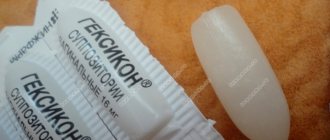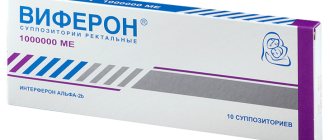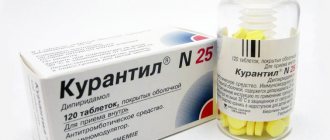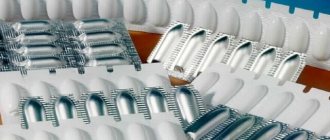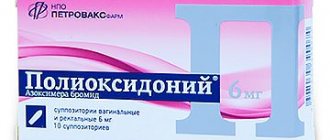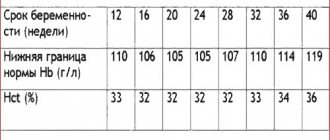Category: Published 05/04/2016 · Comments: · Reading time: 4 min · Views: 5,638
“Papaverine”, what does this antispasmodic help with? The medicine effectively reduces the tone and contractile function of smooth muscles. The drug has antihypertensive and analgesic effects. The instructions for use of the drug “Papaverine” prescribe its use for cholecystitis, renal colic, and angina pectoris.
pharmachologic effect
Let's look at what Papaverine tablets are used for and what effect the drug has on the body. For adults and children, the medicine is prescribed to eliminate spasms and pain in various conditions. In addition, the medicine has a mild vasodilator effect, which can lower blood pressure.
The tablets help relieve spasm of the smooth muscles of the uterus, stomach, intestines, gallbladder, bronchi, larynx, kidneys, bladder, blood vessels and some other organs.
After the active component penetrates the blood, the activity of the phosphodiesterase enzyme is inhibited, which leads to a decrease in the amount of calcium in the human body, as a result of which the ability of smooth muscles to contract decreases and this process slows down.
Important! Despite the ability of the drug to relax smooth muscles, a person’s motor activity is completely preserved after taking the drug.
How does it work?
Papaverine hydrochloride has an antispasmodic effect, since under its action smooth muscles relax and their tone decreases. Thanks to this, the drug helps to get rid of pain that occurs as a result of spasm of the smooth muscles of the intestines, bronchi, stomach, urinary and gall bladder. After taking it, pain is eliminated, and organ functions are restored.
“Papaverine” also acts on vascular walls, as a result of which the vessels dilate and blood pressure begins to decrease. Another “target” organ of such an antispasmodic is the muscular lining of the uterus. Under the influence of its active substance, the spasmodic areas of the myometrium relax, and their blood supply improves.
Indications
The drug should be taken only with the permission of a doctor. It is strictly forbidden to carry out treatment with this remedy yourself, as it has some contraindications. Papaverine tablets are recommended for the treatment of the following conditions:
- renal colic;
- inflammatory process of the gallbladder, accompanied by spasm and pain;
- spastic colitis;
- hepatic colic;
- to relieve uterine tone;
- in complex therapy of bronchospasms;
- treatment of angina pectoris, recovery after heart attack, stroke.
Papaverine eliminates spasms and has a mild analgesic effect
More often, Papaverine is prescribed as a complex therapy; for independent treatment, the drug is used less frequently, since it only relieves the symptoms of a particular pathology.
Features of the drug
Papaverine is produced by several pharmaceutical companies in three different forms.
- One of the most popular are rectal suppositories , which are sold ten pieces per pack. They are characterized by an elongated shape and a yellow-white color. The average price of one package of this over-the-counter product is 50-80 rubles. It should be stored at home in a cool place, and the shelf life of such suppositories is 2 years.
- No less popular is “Papaverine” in tablets, which have a round shape and a white tint. They are packaged in boxes of 10, 20 or more tablets, are also sold without a prescription and are the most affordable, as they cost about 10 rubles for 10 pieces. It is permissible to store this medication at home at room temperature, and its shelf life is 3 years.
- The third form of "Papaverine" is a solution intended for injection. It is transparent and often colorless, but can also be greenish-yellow. One package of this drug includes 5-10 ampoules of 2 milliliters of sterile liquid. Unlike the other two forms, to purchase an injection solution you need a prescription from a doctor, and the cost of 10 ampoules is 30-70 rubles. To store this “Papaverine” you need a cool place, and its shelf life is 2 years.
The action of all forms of the drug is determined by the same substance, which is called “papaverine hydrochloride”. For this reason, the word "hydrochloride" is sometimes included in the name of the drug. One suppository contains this compound in a dose of 20 mg, one milliliter of solution for injections - in the same dosage, and one tablet - in an amount of 40 mg.
In suppositories, in addition to the active ingredient, there is only a fat base, thanks to which the suppositories have a certain shape and are easy to administer. The tablet form additionally includes sucrose and stearic acid, as well as starch. In addition to papaverine, the composition of the sterile solution contains disodium edetate and methionine, and the remainder is filled with water for injection.
Contraindications
Papaverine should be used in strict accordance with the instructions for use or according to the regimen prescribed by the doctor. Violation of the method of administration and dose of the drug can cause severe complications and side effects.
Contraindications for the medication:
- child's age up to six months;
- elderly age. Among patients over 65 years of age, it is recommended to use the drug under the strict supervision of a specialist;
- persistent hypotension;
- the presence of an allergic reaction to the active component of the drug or its excipients;
- precoma or coma;
- disturbance of atrioventricular conduction;
- glaucoma.
Papaverine tablets cannot be combined with certain medications, so before starting use you should consult your doctor and tell him if you have taken any medications before.
Release form and composition
Papaverine has several forms of release:
- solutions for injections;
- pills;
- suppositories.
Papaverine is sold in ampoules made of glass. They are sealed in blister packs in a cardboard pack of 10 pieces. The volume of one ampoule is 2 ml. This includes the active substance (papaverine hydrochloride) - 0.02 g and auxiliary components. The latter include methionine, disodium salt of ethylenediaminetetraacetic acid (Trilon B), and water for injection.
Dosage and methods of administration
Papaverine should be taken according to a regimen selected by the doctor based on the patient’s diagnosis. The tablets are intended for oral administration. It is recommended to take the medicine with water. The standard dosage regimen for adults is 3 tablets throughout the day. For children, the dosage is 1–2 tablets, depending on weight, age and other individual characteristics. The duration of therapy is selected for each patient separately.
The dose and regimen of the drug are selected by the doctor
The use of suppositories with papaverine depending on the stage of pregnancy
As a rule, candles with papaverine or nosh-pa are not used separately.
Depending on the problem, antispasmodic drugs are usually prescribed in combination therapy with other drugs.
First trimester
In the first trimester of pregnancy, until the placental protection of the fetus has formed, the list of medications that have no contraindications for use is very limited. This is related to the popularity of prescribing papaverine suppositories as antispasmodics.
As a rule, at this time a woman suffers from toxicosis, so taking antispasmodic tablets is not advisable.
Use by pregnant women
How should pregnant women take the medicine? Papaverine during pregnancy is prescribed to patients by a leading physician in the presence of indications such as increased uterine tone, high blood pressure and some other conditions accompanied by spasm of smooth muscles. The dose of the drug is selected individually, usually 3 tablets throughout the day. The duration of treatment depends on the symptoms and the demonstrated therapeutic effect. In late pregnancy, the medicine is used to lower blood pressure in uncomplicated gestosis.
Important! Every woman must strictly adhere to the doctor’s recommendations, follow the dosage and dosage regimen of the drug.
Is it possible to use Papaverine hydrochloride suppositories during pregnancy?
During the period of nine months of bearing a baby, few women will not resort to the help of this drug at least once. Some reduce the increase in uterine tone regularly, while others use the product only occasionally, for example, after a hard day at work or being on their feet for a long time, as well as during periods of severe stress, in order to save themselves from possible problems and eliminate risks to the fetus.
The instructions for Papaverine suppositories during pregnancy say that there is no data indicating the effect of the drug on the body. Moreover, during clinical observations over many years of use of the product by pregnant women, no negative effect on the fetus or the course of pregnancy was established. Of course, you should not prescribe such a drug yourself, since only a specialist can correctly assess the condition of the female body and determine the need to use the drug.
Papaverine hydrochloride has a pronounced antispasmodic effect of a myotropic nature, affecting not only the muscles of the uterus, but also the smooth muscles of many other organs, for example, the respiratory, urinary, and reproductive systems. The effect of the drug also extends to the gastrointestinal tract. By influencing the smooth muscles of blood vessels, the drug promotes their expansion, which significantly improves blood flow and reduces pressure. During pregnancy, Papaverine is most often used to eliminate spasms of many internal organs, peripheral and cerebral vessels, bronchi, uterine hypertonicity and improve placental blood flow.
It is recommended to cleanse the intestines before administration.
The dosage of suppositories with papaverine during pregnancy is determined by the doctor, but in most cases suppositories should be administered 2 to 4 times a day, maintaining equal time intervals. The duration of treatment in each case will be individual, it depends on the symptoms and condition of the patient. On average, treatment can last from several days to a month, but sometimes longer.
Once in the rectum, the suppository begins to dissolve under the influence of body temperature, gradually releasing the medicinal substance, which is absorbed into the bloodstream and delivered by the circulatory system to all organs, affecting the blood vessels along the way. Under the influence of the drug, the level of excitability of the uterine muscles is significantly reduced, pain and tension are eliminated, and at the same time blood pressure decreases, which is necessary for many pregnant women in later stages. So, to the question of where to place suppositories with papaverine during pregnancy, every doctor will answer - in the rectum exclusively by the rectal method. Under no circumstances should they be used vaginally.
Side effects
Papaverine has mostly positive reviews. Side effects are extremely rare. The cause of negative consequences is a violation of the dosage and regimen of medication.
The main side effects while taking the medication:
- nausea;
- rarely vomiting;
- severe decrease in pressure;
- rashes on the body of an allergic nature;
- eosinophilia;
- increased sweating;
- dyspeptic disorders;
- heart block.
Side effects include headache, nausea and other symptoms
Taking too large a dose of the drug can cause cardiac dysfunction, drowsiness, and double vision. If these symptoms appear, the patient should be immediately taken to a hospital, where gastric lavage and other medical measures are performed.
Instructions for using injections
For the most effective effect of the drug, it is necessary to follow the dosages and injection rules specified in the instructions.
Method of administration
The drug can be administered in one of three ways.
- Intravenously.
- Intramuscularly (upper outer quadrant of the gluteal muscle).
- Subcutaneously (outer thigh or shoulder).
For intravenous administration, it is necessary to first dilute the drug with sodium chloride solution (0.9%). For 20 ml of papaverine there should be 10-20 ml of solvent. The finished mixture must be introduced very slowly. Otherwise, the patient will feel severe pain in the injection area. It is recommended that the procedure be performed by a qualified healthcare professional.
When administered intravenously, the following regimen should be followed.
- Heat the drug by squeezing it in your palms for a few minutes.
- Disinfect the ampoule by wiping it with a cotton pad soaked in alcohol.
- Add papaverine and other components of the lytic mixture into the syringe in the required proportions.
- Disinfect the injection site.
- Place the syringe perpendicular to the injection site. Insert the needle into the skin 2/3 of the way.
- Introduce the medicine slowly.
- When lumps appear, it is necessary to apply an iodine net to them and the surrounding area.
Injections with Diphenhydramine
Papaverine is often used as an antipyretic agent as part of a lytic mixture. In addition to it, Analgin and Diphenhydramine are added to the syringe. The mixture can be used by both children and adults.
The effectiveness of the injection composition is significantly higher than that of tablets with a similar effect. This is due to several factors:
- the finished drug is combined, which means that its components affect the body from several sides simultaneously;
- high degree of absorption of Papaverine, due to which rapid spread to the site of inflammation and its elimination are achieved.
Doctors recommend using a complex solution for injection only in cases where the body temperature exceeds 39 degrees. This most often occurs during acute respiratory viral infections and various inflammatory processes. The combination of Diphenhydramine, Papaverine and Analgin is also used by emergency doctors when it is necessary to relieve a patient’s fever as quickly as possible.
Dosage and overdose
The duration of treatment with Papaverine is not limited by the instructions. The course of treatment is continued either until the symptoms of the disease are eliminated, or until the prescription is canceled by the attending physician.
Intravenous and intramuscular injections must be performed in accordance with the dosages regulated by the instructions.
For children, the following rules apply:
- 6-12 months – 0.005 g of the drug;
- 1-3 years – 0.01 g;
- 3-4 years – 0.015 g;
- 4-6 years – 0.02 g;
- 6-9 years – 0.03 g;
- 9-14 years – 0.06 g.
No more than two injections are allowed per day.
After the patient reaches 14 years of age, the dosage of Papaverine for him is 0.1 g. If necessary, up to 3 injections per day can be given. The interval between two injections should be at least 4 hours.
If the injection is injected under the skin, the contents of 1 full ampoule are drawn into the syringe.
Side effects from an overdose of the drug are rarely recorded. However, in some cases, arrhythmia, headaches may occur, sweating increases, vision deteriorates, and general malaise is felt. To eliminate unpleasant consequences, it is necessary to perform gastric lavage and symptomatic therapy.
Analogs
Papaverine analogues, similar in their indications and areas of application, are as follows:
You can also read: Instructions for Ascorutin tablets
- Riabal is indicated for patients with diseases of the digestive system, accompanied by pain and spasm of smooth muscles. The drug is widely used for diseases of the urinary system;
- Dibazol is an antispasmodic drug that has a mild analgesic, vasodilator, and hypotensive effect. Among the indications for use of the drug are pathologies that cause spasms of blood vessels, exacerbation of hypertension, diseases of the digestive system accompanied by spasms, and other conditions. The drug is available in the form of tablets and solution for intravenous administration;
- Platiphylline is a drug that has a sedative, antispasmodic, and analgesic effect on the body. The medicine is used for stomach cramps, gastritis, ulcers, acute and chronic pancreatitis, cholecystitis, bronchospasms, as well as to reduce blood pressure in hypertension and other diseases of the cardiovascular system;
- No-Shpa is a widely used drug used as an additional therapy for many pathologies. No-Shpa is prescribed to eliminate spasms of internal organs and blood vessels. The medicine helps relieve pain in gastrointestinal pathologies, diseases of the respiratory system, heart and blood vessels, diseases of the genitourinary system and other organs;
- GastroComfort is a herbal medicine that includes cumin, dill, fennel and other components. The drug is prescribed to patients with diseases of the digestive system. Among the main indications are pain, spasms of the stomach and intestines, flatulence and other manifestations.
Dibazol is one of the analogues of Papaverine
Important! Each of the analogues has its own contraindications, so they can only be used with the permission of a doctor.
What to replace it with?
"No-shpa"
The most famous analogue of “Papaverine” can be called “No-shpu”. This medicine belongs to the same group of drugs, since its main ingredient (drotaverine) is also able to relax smooth muscles and eliminate spasms.
“No-spa” is in demand for uterine hypertonicity, is considered a more modern and safe medicine, and is available in tablets and solution for injections. This medication can be used for headaches and intestinal spasms. It is allowed at any stage of pregnancy as it does not interfere with fetal development.
The main contraindication to the use of No-shpa is hypersensitivity. The drug is also not prescribed if the expectant mother has impaired kidney function, worsened liver function, or developed heart failure.
After consulting with your doctor, you can replace “No-shpa” with any other medicine with the same active compound, for example, take “Drotaverine”, “Spazmol”, “Spazmonet”.
"Viburkol"
Another remedy that can be used instead of Papaverine for increased uterine tone is Viburkol. This is a homeopathic medicine with a natural complex composition, produced in the form of rectal suppositories. It has anti-inflammatory, analgesic, antispasmodic and some sedative effects due to chamomile and belladonna.
Expectant mothers can administer such suppositories not only for hypertension, but also for diseases of the bronchi or genitourinary organs, as well as for flatulence and ARVI. They do not harm the baby in the tummy and can be used even in newborn babies.
The only prohibition for using Viburkol is individual intolerance.
The drug is used rectally, and side effects are detected extremely rarely.
For more information about uterine tone, see the following video.
Drug interactions
In combination with other medications, the effect of Papaverine may increase or, conversely, decrease.
Strengthen the effect of the medicine:
- barbiturates;
- Procainomide;
- Quinidine;
- Reseprine;
- tricyclic antidepressants.
Reduces the effect:
- Levopoda;
- Methylpoda.
Before using Papaverine, you should inform your doctor about any medications that the patient is taking or took the day before.
Contraindications - to whom and when Papaverine is prohibited
In order to avoid the appearance and development of allergic reactions, you should not take Papaverine if you have an individual intolerance to the active substance or other components of the drug. Medication treatment should be interrupted immediately if signs of allergy are detected. The instructions for the medicine state that the contraindications for Papaverine are as follows, and it is prohibited to take it:
- small children (up to 6 months);
- To old people;
- those who have arterial hypotension (low blood pressure);
- patients with glaucoma;
- people with renal failure (the kidneys simply will not be able to fully remove the components of the drug from the body);
- hospital patients in a coma.
Important: simultaneous use of Papaverine and drugs from the group of monoamine oxidase inhibitors is strictly prohibited!
Papaverine should be taken with extreme caution by those diagnosed with:
- traumatic brain injury;
- hypothyroidism;
- prostatic hyperplasia;
- state of shock;
- supraventricular tachycardia;
- adrenal dysfunction.
Special Recommendations
The drug Papaverine is prescribed exclusively by a doctor. The specialist selects the dose and regimen of the medication. The course of therapy usually lasts from 7 to 14 days until pain is completely eliminated.
Give medicine to children with extreme caution. If the child has not learned to swallow the tablet, it is recommended to crush it into powder, mix it with a small amount of water, and give it to the baby.
It is strictly forbidden to combine Papaverine with alcoholic beverages
In case of acute pain syndrome caused by severe diseases of the gastrointestinal tract, respiratory system and cardiovascular system, Papaverine tablets should be replaced with injections.
It is strictly forbidden to combine the drug with alcoholic beverages.
The drug does not affect concentration and memory, so it can be prescribed to patients with various professional activities.
Useful video about uterine hypertonicity
During pregnancy, a woman often faces a dilemma: whether to take medications, even those recommended by a doctor, or whether to refrain from “chemistry.”
However, pregnancy lasts more than one day or even a month. For nine long months, drug therapy may be required, for example, in order to maintain this very pregnancy and so that the baby in the womb feels comfortable until the due date.
Therefore, if a medical prescription includes taking medications, then this should be taken with due attention. Taking such drugs, as a rule, is justified, and their safety has been confirmed by generations of our mothers and grandmothers.
Among the medications prescribed to women during pregnancy, papaverine is often found.
Patient reviews
Veronica, Volgograd “I suffer from peptic ulcer disease, which is constantly getting worse. In combination with other medications, I take Papaverine tablets during periods of severe pain. The product is cheap, but very good. Within 15 minutes after consumption, relief occurs. For several years of taking it there were no negative consequences. I consider this medicine to be the best antispasmodic in terms of price and quality.”
Valeria, Izhevsk “I was diagnosed with hypertension at a fairly young age. I often experience headaches, weakness, apathy and other unpleasant symptoms. The attending physician prescribed me Papaverine as an adjuvant. Since then I always carry the pills with me. The drug helps relieve pressure and relieves pain. The price of the medicine and its effect suit me quite well.”
Elizaveta, Minsk “I take Papaverine for abdominal pain. I don’t trust imported expensive products, because I believe that they are made on the basis of the same active ingredients, but are much more expensive. Papaverine quickly eliminates spasms and alleviates the condition. I recommend this drug to everyone."
Maxim, Cheboksary “Several years ago I was diagnosed with urolithiasis. Since then, the pebbles periodically come out on their own, as they are small in size. Papaverine helps me cope with pain during this period. The process of removing the stone becomes less painful. To be fair, I want to say that I would not advise self-medication, because renal colic may occur. It is best to carry out treatment under the supervision of a physician."
Anton, Moscow “My father was prescribed this drug during the recovery period after a heart attack to normalize blood pressure. The product is cheap, but works great. At least we didn't have any problems with him. There were no side effects or complications."
How to use?
Suppositories
The most popular form of “Papaverine” during pregnancy can be called suppositories, since the tablets begin to act later, and with increased tone, the therapeutic effect must be obtained as quickly as possible. They are indicated for home use and improve the condition of the pregnant woman within 10-15 minutes after administration. In addition to the fact that the active substance is absorbed from a suppository faster than from a tablet, it also acts for a longer time.
The drug should be used only after consultation with a doctor, who will determine a single dosage suitable for a particular woman. After removing the suppositories from the package, they are inserted into the rectum, preferably after natural emptying. The manipulation is performed lying on your side.
The standard single dose is 1 suppository.
The administration of suppositories should be carried out at equal intervals 2 times a day, and sometimes three times a day.
Pills
“Papaverine” tablets are swallowed without biting or crushing, washed down with water. This form is in demand for headaches, intestinal spasms and other conditions. Meals do not affect the time of its use, but if the reason for using this “Papaverine” is problems with the gastrointestinal tract, it is better to drink the drug 30 minutes before meals.
Typically, a single dose for a pregnant woman is one tablet. This product is used as needed, but not more than 3-4 times a day.
Injections
If an immediate antispasmodic effect is required, the doctor will prescribe Papaverine by injection, since its effect begins to develop a few minutes after the active substance enters the woman’s body. Injections are usually given intramuscularly, but the drug can be injected into a vein or under the skin.
The doctor must determine which method is preferable in a particular case. For example, if there is a high risk of miscarriage, the woman is hospitalized and immediately given an intravenous injection so that the drug works as quickly as possible.
The procedure must be performed by a medical professional. If the drug is prescribed intravenously, the Papaverine solution is additionally diluted with isotonic sodium chloride solution.
In order not to provoke a strong decrease in blood pressure, heart rhythm disturbances and other side effects, droppers are often prescribed. Intramuscular injections are performed twice or thrice a day, with 20-40 mg of the active substance used per injection. There should be a break of at least four hours between two injections.
The duration of use depends on the therapeutic effect: in acute conditions, the drug is prescribed for 2-5 days, and for the treatment of chronic pathologies, a longer course of administration is used, for example, 1-2 weeks.
Overdose
An increase in the daily and single dose of papaverine is dangerous during gestation and is accompanied by the following consequences:
- a sharp loss of strength (possible fainting) and increased drowsiness;
- decreased sharpness of vision, severe doubling of objects;
- a strong decrease in blood pressure;
- irregular heartbeat;
- in rare cases, severe relaxation of the muscle tissue of the uterus is possible, which will lead to dilatation of the cervix (dangerous termination of pregnancy).
In case of overdose, urgent gastric lavage (at least 2 liters of water) and intake of activated charcoal is necessary. If necessary, perform blood purification using a hardware method using hemodialysis. After the general condition improves, it is necessary to undergo tests and check the functioning of the heart using an ECG.
The difference between Papaverine and other antispasmodics
“Papaverine” began to be produced and actively used in medical practice since 1930. A little later, namely in 1960, it was possible to obtain its derivative with a selective and at the same time pronounced antispasmodic effect. Under the trade name it became known as “No-shpa”. According to most doctors, this drug is more effective and safer than Papaverine, since its use is rarely accompanied by side effects, and they do not differ in the spectrum of action. However, due to the low cost (a package of tablets costs 22 rubles, and candles - 97 rubles) and the habit of using the familiar product, No-shpe, it was not possible to completely displace Papaverine from the pharmaceutical market.
The remedy described in the article relieves spasms well in the acute stage. It is undesirable to use it for the treatment of chronic pathologies, since to achieve the required clinical effect it is often necessary to exceed the dosage. This, in turn, is fraught with dizziness, sweating, impaired myocardial excitability and other side effects.
Considering all of the above, Papaverine is best used for acute conditions. In the course of treatment of chronic disorders, it is preferable to use No-shpu, Duspatalin or Mebeverine. Papaverine is also recommended for use in patients with gastroesophageal reflux disease.
Papaverine suppositories and their analogues
Until recently, suppositories were purchased only with a doctor's prescription; nowadays, Papaverine suppositories can be purchased in free form without providing a prescription to a pharmacist. Papaverine suppositories should be protected from moisture, stored in a dark place, the temperature should not be higher than +25 degrees. Shelf life - 2 years.
Before using Papaverine suppositories, you must carefully study the instructions and also pay attention to the instructions:
Papaverine should be used cautiously for diseases of the kidneys, adrenal glands, and prostate glands. The drug should not be taken while drinking alcohol. During pregnancy and lactation, the drug is used only under the supervision of a doctor, since the safety for the fetus has not been fully disclosed. Papaverine interacts well with other drugs.
Analogs
Riabal - prescribed before an x-ray examination of the colon. The drug is prescribed for vomiting, bloating, spasms of hollow organs, intestinal colic, constipation, hemorrhoids. Spasmolysin - used during pain that is caused by spasm of the smooth muscles of hollow organs, namely gastric ulcers, pancreatitis, proctitis, constipation, colic, and also after operations.
Spasmolin is effective for cholecystitis, gallbladder disease, diseases of the genitourinary system, and is constantly used in gynecology. Niaspam - helps with intestinal spasms, colic, severe, sharp pain in the abdomen. Spascuprel is a remedy prescribed for cramps in the stomach, uterine tone, and urinary tract.
Reviews
Anna, 28 years old. “Papaverine is a wonderful remedy, they gave it to me in the maternity hospital, I had uterine tone, my stomach was always stone-like. I inserted candles once a day, after which I lay down, after a short time the body completely relaxed. It also helped me with constipation when I was pregnant. In my opinion, the substance did not have any negative effect on the fetus.”
Ekaterina, 43 years old. “Indeed, Papaverine is unique, cheap, and helps against all diseases. The doctor prescribed it to me for internal hemorrhoids; I could not go to the toilet normally and experienced pain. The suppositories normalized the stool, and in general I felt good after it. I recommend the drug to all my friends. The doctor told me that you shouldn’t get carried away with it, it can become addictive, as you will have to constantly relax your intestines.”
Papaverine is sold in pharmacies. The average cost of a suppository in a dosage of 20 mg is 70 rubles, 40 mg is 110 rubles. Papaverine is considered an effective drug and is widely used in medicine. The drug should not be used without a doctor’s prescription; the instructions contain contraindications.
Second trimester
This period is already relatively calmer. On the one hand, the threat of miscarriage is reduced, because the fetus is already quite large. On the other hand, the chances of surviving premature birth increase every week. During this period, the list of approved drugs is significantly expanded. To preserve the health of a woman and her baby, Ginipral or magnesia can be used.
But Papaverine suppositories are not canceled at this time. During pregnancy and tone, these suppositories are a real lifesaver. In addition, they can relieve pain or lower blood pressure. This allows you to hold out until the expectant mother can see a doctor.
Side effects of the drug and overdose
The description of the medicine in question includes the following side effects:
- absolute or relative increase in the concentration of eosinophils in the blood;
- bowel dysfunction;
- ventricular extrasystole;
- heart block;
- drop in blood pressure;
- chronic fatigue, loss of ability to work;
- impaired renal function;
- skin rashes in the form of an allergic reaction.
Failure to follow the instructions for taking the drug leads to the development of side effects
Symptoms of overdose include a sharp drop in blood pressure, chronic fatigue, apathy, and less commonly, lethargic sleep, coma. Treatment is carried out in the form of normalization of blood pressure and other vital functions of the body.
Overdose
Symptoms: impaired vision, diplopia, weakness, dryness of the mouth, red skin of the upper part of the mouth, hyperventilation, nystagmus, ataxia, tachycardia, asystole, diarrhea iv, collapse, arterial hypotension, drowsiness, headache, fatigue, constipation, excessive sweating, allergic reactions.
Treatment: administration of the drug, symptomatic therapy. Indicate rinsing the mucus and taking enterosorbents. There is no specific antidote. It is completely removed from the blood during hemodialysis.
Adverse reactions.
On the side of the nervous system: drowsiness, headache, confusion.
On the side of the organs you can feel: blurred vision, diplopia.
On the side of the herbal system: scolial-intestinal disorders, constipation, anorexia, boredom, dry mouth, diarrhea.
On the side of the hepatobiliary system: increased activity of liver transaminases, redness, impaired liver function.
On the side of the cardiovascular system: arterial hypotension, orthostatic hypotension, hot flashes, arrhythmias, tachycardia, atrioventricular block, asystole, extrasystole of the scutum, fibrillation of the scutula, tremors іння shlunochkіv, collapse.
On the side of the organs there is dizziness: apnea.
On the side of the blood system: eosinophilia.
On the side of the skin, subcutaneous tissue and immune system: hypersensitivity reactions, including on the side of the organs, dizziness, anaphylactic shock, itching, sagging on the skin, kropivyanka, reddened skin at the top of the sheepskin coat.
Others: unwellness, increased sweating.
Pharmacodynamics and pharmacokinetics
Papaverine suppositories during pregnancy are prescribed to prevent premature birth or reduce the frequency of contractions during rapid labor. The active element, after absorption, helps to lower the concentration of calcium in muscle tissue, as a result of which muscle tone and spasm decrease.
The advantage of the medication is that it does not provoke muscle paralysis to relieve tension , but gently relaxes only smooth muscle tissue, maintaining its functionality. The effect does not apply to the muscles of the heart and skeleton. That is, the drug, in acceptable doses, does not affect the performance of the heart.
Taking papaverine leads to normalization of stool and relief of pain in the digestive tract due to relaxation of muscle tissue. This is important, since during pregnancy there are often problems with the removal of feces and the movement of food through the esophagus.
It also makes the process of urination easier.
The activity of brain cells improves, which prevents the development of absent-mindedness during pregnancy. Ventilation of the pulmonary system is normalized, which eliminates the lack of oxygen due to fetal pressure on the diaphragm. Gently reduces elevated temperatures.
Additionally, the relaxing effect extends to the blood vessels. As a result, they expand. The nutrition of the organs and tissues of the pregnant woman improves, as well as the supply of nutrients to the fetus. The pressure indicator decreases.
If the permissible dose is exceeded, weakness and drowsiness may develop.
Papaverine, regardless of the form of release, is absorbed into the bloodstream by 54%, and then spreads throughout the body. The decomposition of the drug occurs in the liver. Further excretion, 2 hours after administration (in rare cases, 24 hours), occurs in the urine. If necessary, excess drug can be removed using blood purification equipment.
There are no negative effects on the fetus, since the drug does not reach it.
Suspension during pregnancy or breastfeeding
The drug should be used with caution and in small doses in cases of severe heart disease, chronic neuronal deficiency, lack of supraneural function, hypothyroidism, supraglobulin tachycardia, shock, weakened children m. With caution and at doses lower than the average therapeutic value, the drug should be used in patients with traumatic brain injury and after it, with hyperplasia of the anterior cerebral cortex.
The effectiveness of the drug decreases in case of patellar inflammation.
If the patient has an intolerance to certain sugars, then consult a doctor and first take this drug (the drug contains refined sugar, so that you may suffer from diabetes).
Information on the safety and effectiveness of taking the drug during pregnancy or breastfeeding.
Give children internally 3-4 times per dose.
DETAILS: Levomycetin eye drops indications for use
Doses to be applied throughout the child's life:
- from 6 months to 1 month - 2.5-5 mg (1/4-1/2 tablets) per dose. The maximum dosage is 10 mg (1 tablet);
- 1-2 days - 2.5-5 mg (1/4-1/2 tablets) per dose. The maximum dosage is 20 mg (2 tablets);
- 3-4 days - 5-10 mg (1/2-1 tablet) per dose. The maximum dosage is 30 mg (3 tablets);
- 5-6 days – 10 mg (1 tablet) per dose. The maximum dosage is 40 mg (4 tablets);
- 7-9 days - 15 mg (11/2 tablets) per dose. The maximum dosage is 60 mg (6 tablets);
- 10-14 days - 15-20 mg (11/2-2 tablets) per dose. The maximum dosage is 80 mg (8 tablets).
For children up to 3 years of age, mix a single dose of the drug with 1 teaspoon of boiled, chilled water.
Terms, conditions of sale and storage
Papaverine in any form of release should be stored in a dark place. You can purchase the product without presenting a prescription from a doctor.
Storage conditions for all forms of the drug:
| Release forms of Papaverine | Temperature conditions (degrees) | Storage duration | Storage after opening (hours) |
| Suppositories | 1-5 | 2 years | 6 |
| Injection | 5-15 | 2 years | 2 |
| Pills | 5-25 | 5 years | 12 |
If the storage conditions of Papaverine are violated, the shelf life is reduced.
Interactions with other medicinal drugs and other types of interactions
The antispasmodic effect of papaverine is enhanced by barbiturates, diphenhydramine (diphenhydramine), metamizol (analgin), and diclofenac. The hypotensive effect occurs when combined with antihypertensive drugs of other groups, as well as antidepressants (including tricyclics), procainamide (novocainamide), reserpine, quinidine.
Strengthens the anticholinergic effects of anticholinergic drugs. Papaverine may reduce the hypotensive effect of methyldopa and the antiparkinsonian effect of levodopa. With one-hour treatment with cardiac glycosides, there is an increase in the short-term function of the myocardium due to a change in the peripheral vascular support.
It is possible that the antispasmodic activity of papaverine may be reduced when administered with morphine. Prote papaverine is taken simultaneously with morphine to reduce the spasmogenic effect of the remaining drug and with promedol for pain associated with spasms of smooth muscles.
Stock
active ingredient: 1 tablet papaverine hydrochloride 10 mg;
additional ingredients: refined sugar, potato starch, stearic acid, talc.
Medicine form. Pills.
Main physical and chemical properties: white color tablets. The tablets are embossed with two perpendicular marks, dividing the tablet into equal parts.
Pharmacotherapeutic group. Ways to deal with functional disorders in the herbal system. Papaverine. ATX code A03A D01.
Pharmacological power.
Pharmacodynamics. Myotropic, antispasmodic and hypotensive.
The drug reduces tone, changes the immediate activity of smooth muscles and causes a vasodilator and antispasmodic effect. Papaverine is an inhibitor of the phosphodiesterase enzyme, which causes intracellular accumulation of cyclic 3′,5′-adenosine monophosphate (camp). Accumulation of tension leads to impairment of the speed of smooth muscles and their relaxation during spasticity. The effect of the drug on the central nervous system is weak, and even in higher doses it exhibits a sedative effect.
Pharmacokinetics. Absorption level is high; bioavailability for the average – 54%. Binding with blood plasma proteins – 90%, stabilizes stable complexes with blood serum albumin. It is well distributed in tissues of the body and penetrates histohematic barriers. Metabolized in the liver. T½ – 0.5-2 years (can last up to 24 years). It is mainly excreted in the form of metabolites. It is completely removed from the blood during hemodialysis.
DETAILS: Cough pressure and temperature

